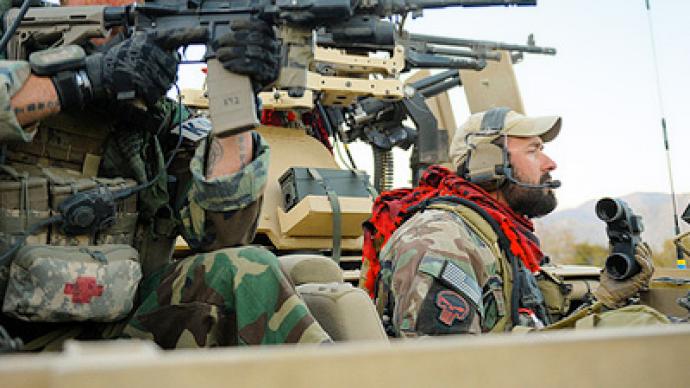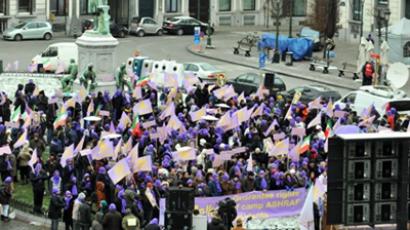US wasted billions in Afghanistan

After having wasted billions in Iraq, Washington has been washing billions more in Afghanistan – in a war that has lasted longer than American involvement in WWII.
“About 375 billion dollars has already been spent on the afghan war. this doesn’t include basic things like care for soldiers in the future,” said Tom Engelhardt, author of “The American Way of War: How Bush’s became Obama’s” and of Tomdispatch.com. What this amount doesn’t include is the cash that goes missing into the abyss. From ghost construction projects which remain incomplete to arms that end up in the wrong hands, billions of dollars pumped by the US into Afghanistan do not end up where intended.“There is a significant portion of reconstruction money that actually doesn’t ever make it to Afghanistan. It goes into the pockets of the experts,” said Engelhardt. Corruption is one of the major reasons for the US dollar not finding its way to where it’s actually headed. According to Transparency International, Afghanistan comes second only to Somalia as the most corrupt country in the world.“Immediate relatives of Hamid Karzai travelling with unspeakable millions of dollars in cash which is, of course, not that I know any details, but not the stuff that makes people not wonder about corruption,” said Economist Max Fraad Wolff, from The New School in New York. “The Wall Street Journal the other day, they figured that about 10 million dollars a day was simply leaving from Kabul Airport. The Afghan GDP is only 13 billion dollars – that’s a quarter of the GDP going out a year – just out of Kabul Airport,” added Engelhardt. The war is not going away any time soon.“It looks likely to last three to four more years,” said Wolff. Where will billions more of taxpayer dollars end up?“I think we’re gonna see them at the gambling tables of Abu-Dhabi by the sound of it. This is not a situation where the money is going to be traceable,” said broadcaster and best-selling author Laura Flanders. The cash fraud, mismanagement and shady record-keeping have been going on for quite a while. The US has already been fighting in Afghanistan longer than it was involved in the Second World War.Accidentally losing a few bucks here and there can happen to anyone, but consistently sending enormous amounts of cash down the drain takes real effort and persistence. Moreover, this is far from the only war that has seen billions of dollars gone missing, simply swallowed up by the shadows."The United States had 9 billion and then a little bit later another 9 billion that simply went missing in Iraq, so this is old stuff that money disappears, and it’s old stuff that money that’s put into the Pentagon in this country can become part of a so-called black budget that we never get to see much about,” said Flanders.There is no one more upset about the situation than those Americans that are flat out broke and jobless. One out of millions of people to ask is Larry Hales, who has been unemployed for over a year and a half.“It’s infuriating, because we’re the ones who are always left out in the cold while we are bombing and murdering people in Afghanistan – the poorest country in the world,” he commented. This is also upsetting to countless experts who say that the US Afghan strategy has been flawed altogether.“What we need is not a surge – of money, of troops, we need a surge of diplomacy in the region”, said Katrina vanden Heuvel, editor and publisher of “The Nation” magazine. “It’s a misguided war. We need as quick and responsible an exit from that country.”But until that happens, the question of how the US can afford to waste so much abroad, when so many have nothing at home, may never be answered.Robert Naiman, the policy director at Just Foreign Policy, said the cost of war is outrageous and the return has been very minimal. “A majority of Americans don’t think the war is worth it, don’t think that the war is protecting Americans,” he commented. “The 16 US intelligence agencies, their consensus document on national intelligence estimates has given a very different picture than the White House’s rosy Afghanistan review. They don’t see progress, they see constancy.” The great amount of money has not helped secure a stronger US national security; it has not achieved progress in Afghanistan or Pakistan and has not made Afghanistan a more secure nation. “To claim progress is fundamental y misleading,” Naiman added. “There’s no evidence that the quagmire has changed or that it will change anytime in the foreseeable future.”
The Afghan insurgency has spread, civilians are less safe and the Afghan population is less and less sympathetic to American goals than ever before, argued Derrick Crowe from Rethink Afghanistan. Money is being wasted; simply sending home a small portion of troops alone would free up a great deal of funds that could be invested in the Afghan people, such as providing care and adequate higher education for all of Afghanistan, argued Crowe.“You could be hiring many many times over the entire labor force of Afghanistan for what we’re spending per year there. We’re trapped in a model that, you know, any kind of spending that’s on military spending must be good and must be helping the American security outlook. But, we’ve seen that’s absolutely not true,” he said. “At some point our political leaders are going to have to get the backbone to just say enough is enough.” There is no progress in Afghanistan, Crowe contended. The broader strategic goals in Afghanistan have not been accomplished; little has been done to achieve them. “The insurgency is organizationally and geographically expanding,” he added.














